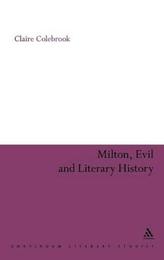
|
Milton, Evil and Literary History
Hardback
Main Details
Description
Milton, Evil and Literary History addresses the ways in which we read literary history according to quite specific images of growth, development, progression, flourishing and succession. Goodness has always been aligned with a life of expansion, creation, production and fruition, while evil is associated with the inert, non-relational, static and stagnant. These associations have also underpinned a distinction between good and evil notions of capitalism, where good exchange enables agents to enhance their living potential and is contrasted with the evils of a capitalist system that circulates without any reference to life or spirit. Such images of a ghostly and technical economy divorced from animating origin are both central to Milton's theology and poetry and to the theories of literary history through which Milton is read. Regarded as a radical precursor to Romanticism, Milton's poetry supposedly requires the release of his radical spiritual content from the fetters of received orthodoxy. This literary and historical imagery of releasing the radical spirit of a text from the dead weight of received tradition is, this book argues, the dominant doxa of historicism and one which a counter-reading of Milton ought to question.
Author Biography
CLAIRE COLEBROOK teaches English Literature at the University of Edinburgh, UK.
Reviews'The starting point of this bold and ambitious book is Milton's hostility to 'system'. Countering the Romantic view that Milton wrote 'in fetters', Claire Colebrook recovers the dynamic quality, the vitalism, of his prose and poetry, which locates the divine in many different and shifting forms, and she defends this recovery as a necessary counter-response to a tradition of literary criticism that would, mistakenly, rescue Milton from his own theodicy. But more than this, Colebrook makes an eloquent and original defence of the relevance of Milton today ... This is a major contribution to Milton studies and the history of critical thought.' - Jennifer Richards, University of Newcastle-upon-Tyne -- Jennifer Richards, University of Newcastle-upon-Tyne Mention -Chronicle of Higher Education, May 30, 2008 "Colebrook's book is consistently interesting and presents often surprising dialogues between Milton's works and later theorists ... Claire Colebrook's exacting analysis is a welcome addition to the flurry of scholarshup for Milton's 400th year." Times Literary Supplement, January 2009 Mention in Studies of English Literature 1500-1900 (SEL), Vol. 49, Winter 2009 "In this clearly written, well-researched, and extraordinarily insightful book, Colebrook posits vitalism in Milton's poetry...Valuing intuition, human dynamism, and individuals' perceptual interaction with the world and others, Colebrook reanimated Milton's poetry so that the reader becomes a site of meaning...Summing up: Highly recommended. Graduate students and above." - A. C. Labriola, CHOICE, September 2008 -- A. C. Labriola * Choice *
|